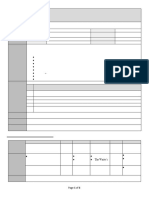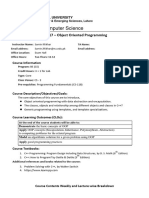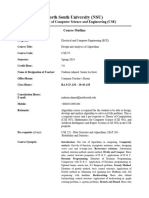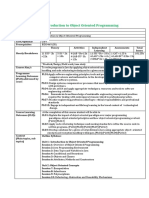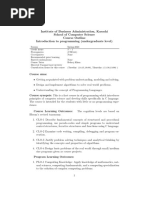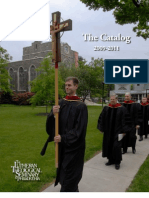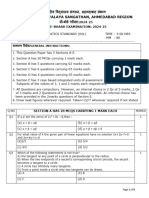Course Outline Programming
Uploaded by
acernitro88588Course Outline Programming
Uploaded by
acernitro88588National University
of Computer & Emerging Sciences-Faisalabad
CS118 – Programming Fundamentals
A. Course Description
Course Code CS-118
Course Title Programming Fundamentals
Credit Hours 3+1
Prerequisites by Course(s) and None
Topics
Assessment Instruments with Quizzes: 10
Weights (homework, quizzes, Project: 5
midterms, final, programming Assignment: 10
assignments, lab work, etc.)
Class Participation: 5
Mid-1:10
Mid-2:15
Final:45
Course Coordinator Saqib Hayat / Rizwan ul Haq / Zain Iqbal / Ebad Majeed
URL (if any)
Current Catalog Description
Textbook (or Laboratory Manual • C++ How to Program by Deitel & Deitel, Prentice Hall 8th Edition
for Laboratory Courses) C++ Programming: From Problem Analysis to Program Design by:
D.S.Malik
Reference Material • Computer Science Illuminated by Nell Dale, John Lewis, Jones
and Bartlett, Latest Edition
• Just Enough Programming Logic and Design by Joye Farrell.
FAST-NUCES-CFD Page 1of 3 16th September 2020
National University
of Computer & Emerging Sciences-Faisalabad
Course Goals 1. Getting students acquainted with problem understanding, modeling
2. Understanding the concept of Programming Languages.
3. Two major areas to be covered:
i.Computation and problem solving
ii.Implementation in C++ language.
4. Design and implement algorithms to solve real world problems.
Topics Covered in the Course,
with Number of Lectures on Each Week wise Topics Covered
Topic (assume 15-week instruction
and one-hour lectures) distribution
Week 1 Algorithm analysis, problem modeling, Basic
Flowchart and block diagram
Week 2 Data Types, Basic programming with algorithm,
flow chart, Control structures: if-else, nested-if
Week 3 Basics of C++ and memory concepts. Datatypes,
variable, input output
Week 4 Control structures: if-else, nested-switch case
Week 5 Loops: For, While, do-while, Nested loop
Week 6 Mid1
Week 7 Functions, Recursion
Week 8 Introduction to Array (1- dimensional)
Week 9 Multiple subscripted arrays and strings
Week 10 Introduction to Pointers, Pointers to array and
double pointers.
Week 11 Mid2
Week 12 Dynamic Memory Allocation, Pointers functions
and void pointers
Week 13 File Processing
Week 14 File Processing (Binary and Text files), Revision
(structures, Pointers, Arrays)
Week 15 Revision
Week 16 Project evaluations
Laboratory Projects/Experiments There will be weekly labs starting from the first week.
Done in the Course The following is a summary of the Lab exercises given to Students.
• Introduction to Pseudo code, Algorithm and Flowchart and
Programming Fundamentals.
• Introduction to Conditional Statement in C++
• Control Structure (Repetition)
FAST-NUCES-CFD Page 2of 3 16th September 2020
National University
of Computer & Emerging Sciences-Faisalabad
• Functions and Recursion.
• Arrays (1D, 2D, 3D)
• String sorting and searching algorithms.
• Pointers
• Dynamic memory allocation
• Filing in C++
Programming Assignments Done Assignment related to Functions, Arrays, Pointers, Structures,
in the Course Dynamic Memory and File Processing will be done
Class Time Spent on (in credit Theory Problem Solution Social and Ethical
hours) Analysis Design Issues
15% 50% 30% 5%
Oral and Written Communications Every student is required to submit at least _1_ written reports of
typically _2_ pages and to make _1_ oral presentations of typically
_10_ minute’s duration. Include only material that is graded for
grammar, spelling, style, and so forth, as well as for technical content,
completeness, and accuracy.
Plagiarism is strictly prohibited and would be strictly dealt with. Late
submission of assignment will be allowed until its solution is discussed.
It is better to partially attempt what you understand and submit
remaining as late, than to copy from someone else or internet.
- Max Grade penalty of 50% (in assignment) for late submit.
Academic Integrity - Min Grade penalty of 100% (in course) for plagiarism.
When taking help in your assignments (from web)
Zero tolerance on cheating as per - Cite reference clearly, mentioning URL and content taken.
NUCES Policies. All Cases (in any
- Even if referred, it is still plagiarism to use the same sentence or
Assessment Instruments) will be
change it in active/passive form. Use your own words, ALWAYS!.
referred to department committee.
When taking help in your assignments (from peers)
- Discussing assignments with peers is allowed only on discussion
group. Do not provide excuses later.
- Provide help in form of explaining problem rather than explaining
solution. Group discussion is encouraged.
- Attendance and Quizzes will might be held in start of class.
- Exams may be open book (closed notes). Please do NOT write
or mark anything on the book.
Evaluation Policy
- There will be NO compensation for missed quiz.
- All graded evaluations will be property of the instructor.
For NUCES Policies please read the
student handbook. - Take classes only with your section, assigned by NU CS dept.
- IMPORTANT: Always send me same day EMAIL reminder if I
give you any verbal comment e.g class participation bonus, late
submission allowed, leave allowed, average marks etc.
FAST-NUCES-CFD Page 3of 3 16th September 2020
You might also like
- Entrepreneurship Leadership-Case Studies-Gouhar PirzadaNo ratings yetEntrepreneurship Leadership-Case Studies-Gouhar Pirzada6 pages
- National University: CS118 - Programming FundamentalsNo ratings yetNational University: CS118 - Programming Fundamentals3 pages
- Online and Blended Courses-RCS102-Object Oriented Programming 2022No ratings yetOnline and Blended Courses-RCS102-Object Oriented Programming 20222 pages
- ADP (Computing) 1st Programming Fundamental OutlineNo ratings yetADP (Computing) 1st Programming Fundamental Outline7 pages
- CS-217 - OOP - Course Outline - Spring 2021No ratings yetCS-217 - OOP - Course Outline - Spring 20213 pages
- Philippine Countryville College: Computer Studies Department Course SyllabusNo ratings yetPhilippine Countryville College: Computer Studies Department Course Syllabus7 pages
- Semester 1 Programming Fundamental - Course Outline - Spring 2023 (Finalized)No ratings yetSemester 1 Programming Fundamental - Course Outline - Spring 2023 (Finalized)6 pages
- Course Description-FALL-2024 (Programming for Artificial Intelligence).DocxNo ratings yetCourse Description-FALL-2024 (Programming for Artificial Intelligence).Docx6 pages
- American University of Sharjah - College of Engineering: Name and Contact Information of InstructorNo ratings yetAmerican University of Sharjah - College of Engineering: Name and Contact Information of Instructor4 pages
- ABET Course Syllabus - Spring Semester 2024/2025 CS11102 Introduction To Computer ScienceNo ratings yetABET Course Syllabus - Spring Semester 2024/2025 CS11102 Introduction To Computer Science4 pages
- EEI3262 Introduction To Object Oriented Programming - Course SynopsisNo ratings yetEEI3262 Introduction To Object Oriented Programming - Course Synopsis2 pages
- Syllabus: Topic: Basics of Software Development in C# Lecturer: Miloš Kosanović Course ObjectivesNo ratings yetSyllabus: Topic: Basics of Software Development in C# Lecturer: Miloš Kosanović Course Objectives15 pages
- University of Central Punjab: Faculty of Information TechnologyNo ratings yetUniversity of Central Punjab: Faculty of Information Technology6 pages
- EEB334 Computer Programming I Course Outline and Teaching Plan 2022No ratings yetEEB334 Computer Programming I Course Outline and Teaching Plan 20223 pages
- CS11102 Introduction To Computer Science 2023-2024No ratings yetCS11102 Introduction To Computer Science 2023-20245 pages
- Programming Fundamentals Outlines For Session s2020 in Semester at March 9 2020No ratings yetProgramming Fundamentals Outlines For Session s2020 in Semester at March 9 20205 pages
- CMPE109 CMPE Bologna (ENG-TR) - 19.09.2022No ratings yetCMPE109 CMPE Bologna (ENG-TR) - 19.09.20226 pages
- Semester Hours: Contact Hours: 3 Coordinator: Text: Author: YearNo ratings yetSemester Hours: Contact Hours: 3 Coordinator: Text: Author: Year4 pages
- CCS 121 Introduction To Programming-OutlineNo ratings yetCCS 121 Introduction To Programming-Outline9 pages
- ECS 142: Compilers Administrative Matters: Course Objectives InstructorNo ratings yetECS 142: Compilers Administrative Matters: Course Objectives Instructor4 pages
- Chapter - 1 Introduction To Object-Oriented Programming100% (1)Chapter - 1 Introduction To Object-Oriented Programming90 pages
- simplecompoundcomplex-140609054946-phpapp02No ratings yetsimplecompoundcomplex-140609054946-phpapp0218 pages
- Dealing With Nervousness and Building ConfidenceNo ratings yetDealing With Nervousness and Building Confidence10 pages
- Michiel Baas - Muscular India - Masculinity, Mobility & The New Middle Class-Context - Westland Publications (2020)No ratings yetMichiel Baas - Muscular India - Masculinity, Mobility & The New Middle Class-Context - Westland Publications (2020)254 pages
- Instant Download A Connecticut Yankee in King Arthur s Court Webster s Spanish Thesaurus Edition Mark Twain PDF All Chapters100% (7)Instant Download A Connecticut Yankee in King Arthur s Court Webster s Spanish Thesaurus Edition Mark Twain PDF All Chapters75 pages
- Visitation Calendar Per Washington County Suggested Visitation PolicyNo ratings yetVisitation Calendar Per Washington County Suggested Visitation Policy12 pages
- Lesson 14.: Unit Iii. 21 Century LiteraciesNo ratings yetLesson 14.: Unit Iii. 21 Century Literacies70 pages
- Pidato Inggris English is an International LanguageNo ratings yetPidato Inggris English is an International Language2 pages
- Cdacc Written Assessment Nov 2024 Timetable Fair 1No ratings yetCdacc Written Assessment Nov 2024 Timetable Fair 143 pages
- Master of Energy Overview (Including Tuitions)No ratings yetMaster of Energy Overview (Including Tuitions)8 pages
- Mind Map-Factors of Learning and L2 AcquisitionNo ratings yetMind Map-Factors of Learning and L2 Acquisition1 page
- Understanding The Goal of Social Studies: A Step To The Effective Teaching of The SubjectNo ratings yetUnderstanding The Goal of Social Studies: A Step To The Effective Teaching of The Subject13 pages
- The Typesand Factorsof Code Switchingin 22 English Time 22 CourseNo ratings yetThe Typesand Factorsof Code Switchingin 22 English Time 22 Course11 pages
- Doris ZiyuYANG Extended Essay Proposal Form EE PF 1No ratings yetDoris ZiyuYANG Extended Essay Proposal Form EE PF 12 pages





